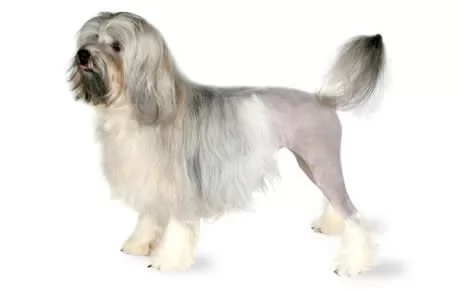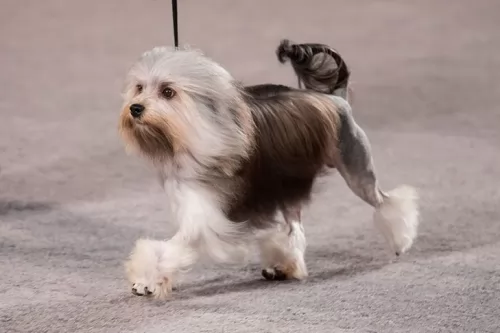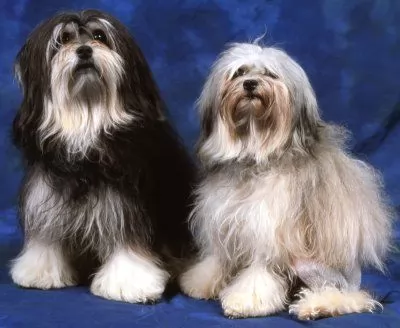 Petzlover
PetzloverKuri is originated from French Polynesia but Lowchen is originated from Germany. Kuri may grow 13 cm / 6 inches higher than Lowchen. Kuri may weigh 7 kg / 16 pounds more than Lowchen. Both Kuri and Lowchen has same life span. Both Kuri and Lowchen has almost same litter size. Kuri requires Low Maintenance. But Lowchen requires Moderate Maintenance
Kurī, also known as Guri or Peroor New Zealand Native Dog, is the Maori name for this dog which was introduced to New Zealand by the Maoris when they migrated from East Polynesia around 1280 AD.
They were in fact Polynesian dogs which died out in New Zealand. The Māoris would use the dog as a food source and the skins would be used to make some form of clothing. The bones were used to make items such as necklaces and fish hooks.
Not surprising then that the dog became extinct in New Zealand, with the last known Kuri specimens being found in the Museum of New Zealand Te Papa Tongarewa.
 Known as the Little Lion Dog, the Lowchen is considered by some registries as a toy dog and by the American Kennel Club as a non-sporting dog.
Known as the Little Lion Dog, the Lowchen is considered by some registries as a toy dog and by the American Kennel Club as a non-sporting dog.
Nobody seems too certain about the true origin of the dog but most records seem to suggest it originates from Germany, France or Holland.
He was bred to catch rats and mice and his history goes way back to 1442, with images of him being found in engravings and paintings. People think he may be related to the Bichon Frise.
His history shows that apart from being used to catch vermin he was also a companion dog to the wealthy. A breeding program for the dog was started in 1944 and they were later imported to Britain in the late 1960s. The dog was given Kennel Club recognition in the UK in 1971, also appearing in America in 1971 with The Lowchen Club of America being formed.
The Kuri is extinct now but it was a small to medium sized dog with a thick set neck. He stood between 25 and 46cm and weighed about 13 to 15 kilograms.
He had thick medium-length rough textured hair, small head, erect ears, short legs and a bushy tail. The color of their weatherproof coats varied and some were black, some white or cream and some were a mix of colors and patterns.
An interesting feature about them is that they didn’t bark but instead they howled. They were good at hunting birds.
The Kuri wasn’t considered the brightest breed, but he would have benefited from some training and socialization as this just makes a dog a better pet in every sense – more obedient and better behaved in all situations.
Some Kuris were friendly and able to bond with their human owners, while others were independent and somewhat aloof. Their size would have allowed them to be kept in the city or the country as they weren’t particularly energetic dogs, not requiring much ground to run around in.
 The Lowchen is a small dog but robustly built and stands at between 25 – 33 cm in height and weighs anything from 4 – 8 kg.
The Lowchen is a small dog but robustly built and stands at between 25 – 33 cm in height and weighs anything from 4 – 8 kg.
He has a long coat which is available in a number of colors - cream, white, grey, black, silver and bi-colored. The single coat isn’t like that of the Bichon Frise, thin and fluffy, but is much thicker, silky and wavy and sheds minimally. People love snipping the long coat cut so that the dog looks like a small lion, short over the body and with a mane, with some hair left around the ‘ankle’ parts of the legs.
The tail is also sheared and left with a pom-pom look. People look at him as an ideal pet as he doesn’t shed much and is looked upon as being a hypoallergenic dog.
He has a wide muzzle and broad, flat skull. The ears are floppy with fringing, the eyes dark, round and intelligent looking. The litter size of this dog is is usually between 3 and 6 puppies.
Intelligent, bright, outgoing and affectionate, you won’t find any aggression in this cute little dog unless the owners have treated him so badly that he wants to be aggressive.
He is such an amicable little pet that he won’t cause you any trouble – he just wants to be your friend. He is a social dog, but can be quite timid when introduced to new people.Socialization and training will do wonders for him and give him some confidence.
He just loves receiving attention and is also prepared to give a lot of attention too. Although he can adapt easily to life in the city or the countryside, he wouldn’t like his owners being at work all day and leaving him alone hour after hour. He is gentle with his human family and sees to it that he gets on well with children as well as pets in the home.
It appears as though some Kuris were kept as pets and that they were able to develop loving relationships with their owners.
We don’t know too much about the extinct Kuri, but scientists are now studying and analyzing the hairs of the dog to find out more about it, and specifically why the Maori dog disappeared some time in the 19th century without a trace.
They will also be analyzing Kuri bones salvaged by archaeologists and which were found on rubbish heaps. These bones can be tested to see whether the diet of the Kuri changed much between the days of Maori settlements and the arrival of the European settlers.
 The Lowchen is sure to make anyone a splendid pet as he is friendly, playful, loving and loyal. He is such a good natured pet and will make a wonderful companion, being able to get on well with children and pets in the home.
The Lowchen is sure to make anyone a splendid pet as he is friendly, playful, loving and loyal. He is such a good natured pet and will make a wonderful companion, being able to get on well with children and pets in the home.
He is energetic too and will love to be outside playing games or joining you on a walk. Those who have had the Lowchen as a pet haven’t been disappointed as they all agree that he makes the most amazing family companion.
Some Kuri dogs scavenged while others were pets and ate well. The lifestyle they led would have determined their health. In those days they would have suffered with dental disease, common in adult dogs. Left untreated, dental disease can lead to dental tartar buildup with gum inflammation and tooth loss.
Dental disease can also lead to other organ diseases. These days brushing your dog’s teeth with canine toothpaste and toothbrush can help to ward off dental disease.
Those Kuris that weren’t pets, tried to survive scavenging, and their homeless situation could well have led to ear infections – caused from a wax- and dirt buildup within the ear. He would have been frantic trying to scratch his ears. In modern times, if your dog showed signs of an ear infection, you would need to get him to the vet.
 The Lowchen is a healthy dog breed so you aren’t going to be spending too much money with him at the vet. Some health concerns with this particular dog breed are cataracts and patellar luxation.
The Lowchen is a healthy dog breed so you aren’t going to be spending too much money with him at the vet. Some health concerns with this particular dog breed are cataracts and patellar luxation.
It can be so sad witnessing your dog’s bright, alert eyes clouding over. Dogs have clear lens, but cataracts, while not painful, can impair vision and actually lead to complete vision loss. As the eye disease progresses, the lens can become completely opaque.
This occurs when the kneecap of the dog is dislocated from its normal position. You’ll see your dog holding up his hind leg every now and then. It can only be returned to its normal position once the quadriceps muscles of the dog relax.
This is a common knee joint problem in dogs and it can lead to arthritis. He will need to get to the vet.
The Kuri will have required regular grooming which means a brushing down twice a week. Brushing would have been useful to prevent loose hairs from shedding with the dog. He would have had to have his ears and eyes checked too to avoid infections. Brushing him would have given his owner the chance to check him over for fleas and ticks too.
As the Kuri wasn’t an overly energetic dog, a walk a day would have kept him content and fit.
The Kuri was a dog that essentially formed part of someone else’s diet. Those that managed to escape being a meal for someone no doubt had to scavenge for food. Because they were used to help people catch birds, they themselves were used to catching birds for themselves.
As a small to medium sized dog, if you were to keep such a dog as a pet you would have given him a cup or two of dried kibble a day and tried to vary his diet by including some home-cooked food and raw meat.
 Because your Lowchen is a bright, happy companion dog you want to ensure that you look after him well to ensure his ongoing wellbeing.
Because your Lowchen is a bright, happy companion dog you want to ensure that you look after him well to ensure his ongoing wellbeing.
The single coat is long and you will need to brush him regularly to keep it looking good. If brushing becomes too hectic, you can have him sheared at a professional dog groomer.
Check him over for fleas and ticks while brushing him.
Feel all over his body for the emergence of new lumps.
Clip his nails to ensure they don’t grow long so that they hook on things and tear his flesh.
Check the inside of his ears to make sure there is no sign of redness and ear infection. This can drive your pet mad with the itching. The ears need to be kept clean, as do the teeth and both these can be done for you at professional dog groomers.
Every dog requires exercise and your Lowchen will need games and walks to keep him fit, to ward off obesity and to provide him with something to look forward to.
Make sure to feed your pet wholesome food as good quality food promotes good health and longevity. Give your Lowchen the best quality kibble there is and try and mix in some homemade cooked chicken, brown rice, pasta and cooked or raw vegetables every now and then just to add some tasty variety to your pets diet. Make sure he always has access to fresh, cool water.
Make sure your Lowchen has a warm, dry comfy spot to sleep, and ensue that when he’s outside he has shade to lie down in.